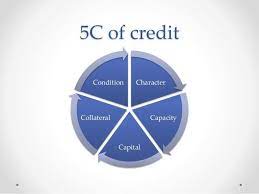When someone, be it an individual or a business, applies for a loan (referred to as “credit” in banking), several factors come into play before a lender decides whether to approve the request. Lenders typically adhere to the 5 Cs of Credit: Character, Capacity, Capital, Collateral, and Conditions. Delving into each of these elements enables the lender to gauge the risk associated with providing the requested funds to the borrower. Explore the breakdown of each C below.
5 Cs of Credit
-
Character
Character looks at a borrower’s track record and reputation in handling financial matters. Lenders firmly believe that past behaviour is a reliable indicator of future conduct. Although each lender has its unique formula for assessing a borrower’s character, involving a blend of qualitative and quantitative methods, a crucial part of this assessment often involves reviewing the applicant’s credit history or score. Credit reporting agencies typically standardize this information to a common scale.
-
Capacity
Capacity is all about your ability to repay loans. Lenders evaluate this by examining your debt in comparison to your income, known as the debt-to-income (DTI) ratio. To figure out your Debt-to-Income ratio (DTI), sum up all your monthly debt payments, then divide that total by your pre-tax monthly income. Finally, multiply the outcome by 100.
Typically, a low DTI ratio signals lower risk for the lender, suggesting that you might have the capacity to take on an extra monthly debt payment. The Consumer Financial Protection Bureau advises maintaining a DTI ratio of 36% or less for homeowners and 15%-20% or less for renters.
-
Capital
Capital involves your savings, investments, and assets that you’re willing to allocate for your loan. For instance, the down payment for a luxury car purchase is a form of capital. Generally, a larger down payment can secure you a better interest rate and loan terms. This is because a substantial down payment reflects your commitment and ability to repay the loan.
While your household income is the primary source for repaying loans, having capital provides an extra layer of security for the lender in case unexpected events, like a job loss, impact your ability to meet your obligations.
-
Collateral
When you’re seeking a loan, offering collateral can strengthen your application. This means that if you’re unable to repay the loan, the lender has the right to take possession of the collateral as payment. Collateral could be your home, a vehicle, or other negotiated assets. The presence of collateral might also lead to a lower interest rate, as it minimizes the risk for the lender.
-
Condition
Conditions include additional details crucial in determining your eligibility for credit and the terms you’ll be offered. Lenders take into account various factors before extending credit, such as:
- Intended Use of Funds: Lenders may be more inclined to provide credit for a specific purpose rather than a general personal loan.
- External Factors: Conditions beyond your control, such as the state of the economy, federal interest rates, and industry trends, are also considered by lenders. While these external factors are beyond your influence, they allow lenders to assess their level of risk before extending credit.
Why Are the 5 Cs Important in Credit?
Understanding the 5 Cs of credit is important for both lenders and borrowers. These factors play a key role in assessing risk and determining a borrower’s creditworthiness. Lenders use the 5 Cs to decide how much someone can borrow and at what interest rate.
For you, as a potential borrower, grasping the significance of the 5 Cs is essential when considering applying for credit. They serve as a handy checklist to guide your financial decisions:
-
Character
Building a robust credit history involves consistently making on-time payments and keeping your credit utilization (the amount of credit you’re using) low.
-
Capacity
Apply for credit only when necessary. A low Debt-to-Income (DTI) ratio signals to lenders that you have the capacity to manage a new loan payment.
-
Capital
Holding cash can enhance your loan qualification, signalling to lenders your level of commitment.
-
Collateral
Some loans and credit cards may require collateral. Making on-time payments and adhering to loan terms ensure you retain ownership of your collateral.
-
Conditions
While you may not control all the conditions affecting your credit application, being aware of them provides insight into your potential credit eligibility.
Balancing the 5 Cs
Strength in one “C” can compensate for a weakness in another. For instance, a lender might be open to providing credit with minimal collateral if the borrower’s cash flows are robust and steady, they have clear access to alternative capital sources, and their historical use of leverage has been sensible.
Likewise, a lender might consider extending higher-than-usual leverage to a borrower with a highly liquid collateral position, such as a portfolio of stocks and bonds that they’re willing to use as collateral.
In essence, no single “C” should be considered in isolation. When assessing a credit request, a lender needs to grasp the interplay of all 5 Cs to form a complete understanding of the borrowing proposal.
Closing Thoughts
So, there you have it – the Five Cs of Credit, decoded and demystified. When you’re thinking about that loan, keep these in mind. It’s like having a cheat sheet for acing the credit game. Be smart, be aware, and you’ll be cruising through the world of credit like a pro. Good luck out there!




